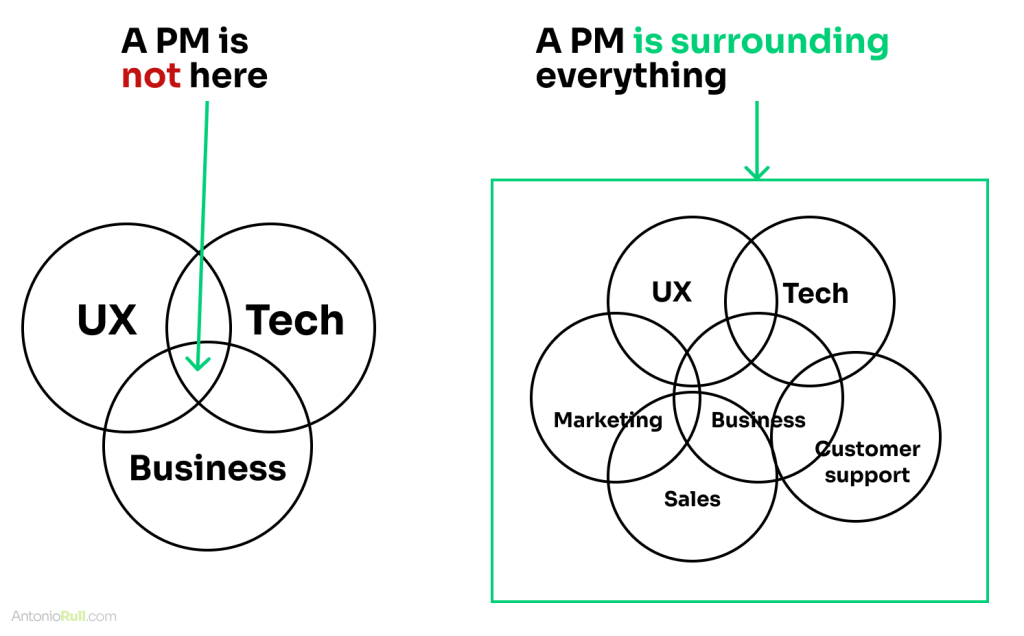The value of Product Managers has been called into question with two key milestones. One, the applause from designers when AirBnB’s CEO said they “got rid” of the role. And two, the layoffs at Factorial, which started with the CPO and continued with many senior product roles out on the street. “We’ve laid off the people with the most responsibility,” said one of the most accountable people running the company.
All this has also brought questioning to the function of the role itself. “So what does a Product Manager do?”, they ask themselves a lot, also the founders of Factorial, who until recently have been betting on a mixed figure of designer and Product Owner called “Product Maker”. It would be foolish not to worry when the founders of a successful product company do not look favorably on the role. It is also true that what worked before, is not certain to work again now.
In that talk at the Figma conference, Brian Chesky also pointed out that “Product Managers are critical, but they shouldn’t do the job of designers“, and he couldn’t be more right. I would add, neither should the job of engineers, or sales people, or….
This whole crisis affects the authority and control we have in our hands. Knowing how to delegate that authority is what many founders seem to be starting to show that they are not willing to do. When you talk to people at Factorial, they tell you that yes, some people have been fired for poor performance, but most of them have been fired at will, those who have been critical and bothersome to the management.
At this point, I ask myself, do all companies that claim to be Product companies need Product Managers? If the future of a product company depends on the direction set by its founders (often pushed by customers with a classic “if you do this feature in two months, I’ll buy you”, especially in B2B), why do you need a Product Manager? Let alone a Chief Product Officer? What you need is a vertical operating structure that executes what is set from above without proposing alternatives. There are many very profitable companies that work this way. There is nothing wrong with assuming what you are.
A Product Manager does not deliver features, he/she must have the authority to achieve business success thanks to the success of the product.
I keep positive, and I believe that all this commotion is a step forward in the understanding of the role of Product Manager, so questioned from time to time for being difficult to explain, understand and adapt. Normally, it sounds better for a company to have Product Managers than to have Project Managers or Product Owners, but whatever they are called, what matters are the tasks and responsibilities they have. Let me be clear: a Product Manager who spends 90% of his time delivering features is not a Product Manager, they are something else, maybe Product Owner, or Scrum Master, but not a Product Manager.
A Product Manager makes a product successful, and that success impacts the business, which is also successful. A Product Manager does not move metrics by making changes in the product, a Product Manager achieves objectives having enough authority to be a part and influence beyond the software roadmap, participates in the structure of the company’s marketing budget, in defining the price and the business model, or in hiring for the Customer Support team. That’s how wide is the impact of a well utilized Product Manager, and that’s why many founders assume this part of the role, leaving the most boring part (delivering features on time) to other people they call Product Managers (but they are not).
We tend to see the Product Manager as an intersection between Business, Development and Design, but I’m beginning to think we’ve fallen into a trap by placing ourselves in a two-dimensional plane; Venn diagrams are very tempting.
My definition of Product Manager is the person who makes sure the right decisions are made, not the decision maker. This is an important nuance, and perhaps one of the reasons why their authority is not always clear, especially in top-down decision structures. Those decisions are not limited to software design and development, but to everything that impacts the success of the business built around a digital product.
If we compare it to an orchestra, the Product Manager is the conductor, not the one who plays a little piano, a little oboe and blows a couple of notes on the flute while the piece is being performed. The fact that Design (the case of AirBnB) or Engineering (the case of Twitter now with Elon Musk) is at the center does not prevent Product from being around it, and this is where the key issue lies. A Product Manager is more important in a digital company than has been generally understood so far in the industry.

The figure above is a theoretical simplification of how far the role can go. In the same way that, in some companies, a Product Manager is not necessary, the momentum of the companies is also relevant to partially fulfill the above representation.
Continuing with the analogy, what seems to be happening at AirBnB and Factorial is that the owner of the philharmonic has told the conductor to back off for a moment, that he’s not doing as well as he should, or that he’s just not doing it the way he likes, that he already directs the musicians and sends the conductor to turn the pages of the musicians’ score. A supercharged HiPPO.
There is also the opposite case, that of realizing the importance of having product management roles in a company. PostHog recently shared some strategic mistakes they have made. Two of them are closely related:
- Waiting too long to hire someone from Product.
- Believing that people want to solve the problem (that they say they want to solve).
Is it a privilege to have Product Managers then?
I don’t think so, for me it is more a way to organize your company, including a specialized role of great responsibility and impact on the business and the product. If anything is clear from the AirBnB and Factorial cases, it is more a lack of trust than the fact that the Product Manager role is going to disappear. The role does what it does, serves what it does, and even if they don’t exist in a company, someone is going to do that job.
Ask yourself this question: is it a luxury to have a design team if just adapting Google’s design system is enough?
Among the countless definitions of the role of Product Manager, I am also very much aligned with this one by Saeed Khan:
Product Management is a system to drive business success. It consists of achieving positive results from products (success), NOT continuous results from products (delivery); because the success of the business HAPPENS due to the success of the products.
In any case, we are not yet at the point where the role has a unique, clear and accepted definition by the industry. The specific tasks are still slipping through our fingers, and in each company a Product Manager will do -or will not do- according to the needs of that company with the team that has been built.
If there is a horizon, it is to have a positive impact on the business from a product. If, in addition to that, you have to write User Stories, then you write them.




